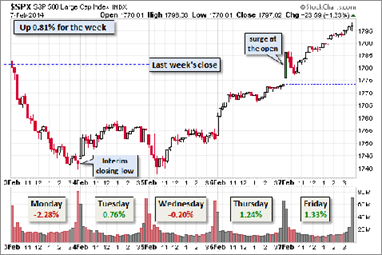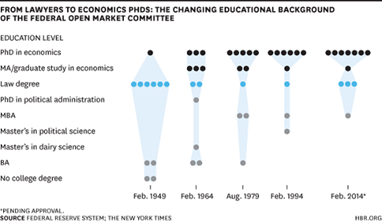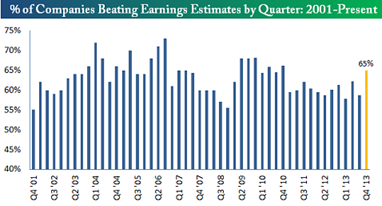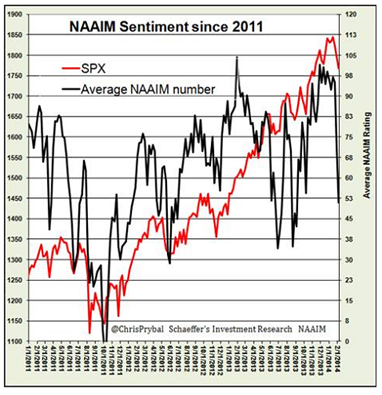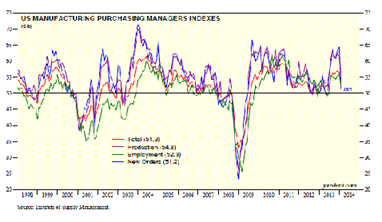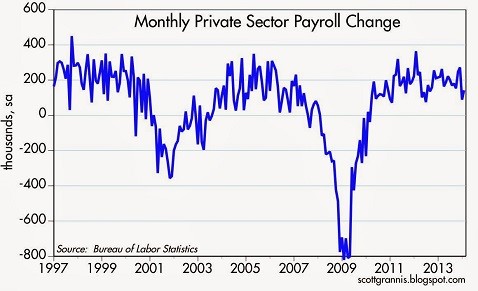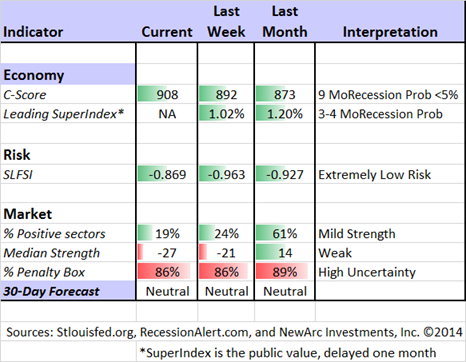After a wild week for U.S. equities and some weak economic data, the market will be curious about how the Fed sees the evidence.
What should we expect from the new Fed Chair?
You might think that the confirmation process has already answered this question. In fact, it is not unusual for office holders to see things differently once actually in the job.
The week ahead also features plenty of other FedSpeak, but less activity on the data front. The Yellen testimony should dominate, starting with the pre-market release of her statement on Tuesday and lasting through the Senate question period on Thursday.
Last Week's Theme Recap
I expected a week-long focus on whether the US economy was stalling out. That was a very good guess. Starting with the weak ISM data on Monday, we had a roller coaster market experience. There was fresh and important data every day. Doug Short captures the story in one of his typically enlightening charts:
Readers are invited to play along with the "theme forecast." I spend a lot of time on it each week. It helps to prepare your game plan for the week ahead, and it is not as easy as you might think.
This Week's Theme
We have a new Fed Chair, making her first appearance before Congress, starting on Tuesday before the House Financial Services Committee and continuing before the Senate Banking Committee on Thursday. (This legislatively-required appearance is semi-annual, with the Senate getting first dibs in the summer). With recent data presenting a mixed economic picture, everyone will be watching for a hint of a policy shift. This will also be the first chance for Congressional critics to take on a new target.
We can classify the various expectations as follows:
- Data imply less tapering. Kathy Lien has a very nice explanation of the "trader perspective." She asks whether weaker data will force Yellen to alter the pace of tapering or change forward guidance.
The main takeaway from Friday's labor market report is that the U.S. economy continues to recover, albeit at a slower than anticipated pace. In some ways, this is good news because it means that the Federal Reserve won't taper asset purchases too quickly. Instead, they may have to consider ways to amend and strengthen forward guidance as the unemployment rate approaches their 6.5% threshold.
- The Fed is dominated by Econ PhD's. True—and a big change. This Harvard Business Review article by Justin Fox explains why and how the change occurred. Hint: A switch from regulation to monetary policy.
- Fed Chairs always face a challenge. Here is the latest installment on this theme, citing the last four instances.
- The Fed will not change policy based upon recent data. Here is Merrill's take via Josh Brown.
As always, I have some thoughts that I will share in the conclusion. First, let us do our regular update of the last week's news and data. Readers, especially those new to this series, will benefit from reading the background information.
Last Week's Data
Each week I break down events into good and bad. Often there is "ugly" and on rare occasion something really good. My working definition of "good" has two components:
- The news is market-friendly. Our personal policy preferences are not relevant for this test. And especially -- no politics.
- It is better than expectations.
The Good
Some of the recent news was pretty good.
- The earnings beat rate has been very strong. The market reaction has been critical, seeking out any flaw in forward guidance, underlying metrics, or the elusive "earnings quality." Better to focus on the actual data. Here is Bespoke's fine summary:
- Earnings growth is close to 10%, year-over-year, just as Brian Gilmartin predicted before the reports started. The earnings story is not just one of beating lowered expectations. Most of the popular reports focus on the expectations dynamic, missing the genuine growth.
- Home prices are up 11% year-over year. December data from CoreLogic (Calculated Risk).
- Initial jobless claims moved lower, back to the 330K range.
- Bullish sentiment declined yet again – a contrarian indicator. I have been showing the weekly changes in the AAII indicator. Ryan Detrick shows several sources. Here is one dramatic example:
- ISM services strengthened – from 53 to 54. Steven Hansen looks at the long-term picture as well as the recent month. He identifies underlying factors that correlate well with economic growth, and notes that they continue to signal expansion.
The Bad
There was plenty of bad news.
- No progress on the debt limit. While I still expect a reasonable and timely compromise, there is no progress so far. Treasury Secretary Lew has now set a deadline of February 27th. (The Hill).
- Rail traffic weakened. GEI has the full story, with a nice table of trend changes.
- High frequency indicators, monitored carefully by New Deal Democrat, are reflecting what he calls a "big chill." Check out the full story to see the weekly update, as well as thoughtful context.
- The ISM manufacturing index showed a big decline. Ed Yardeni looks at the components, the miss, and questions those blaming it on the weather.
- Car sales were generally worse than expected – especially Ford and GM.
- The Employment Situation Report was disappointing in terms of payroll jobs growth. Since that is the best long-term measure, I am scoring it as bad news. There were some mixed aspects to the report, including more jobs in the household survey and a lower unemployment rate. Those objecting to the seasonal adjustment method noted that if last year's method had been used, the job gain would have comfortably beaten expectations. (See Michael Strain at AEI). There were also complications from the annual "benchmark revisions" explained nicely by Felix Salmon. The positive market reaction was mostly ascribed to improved chances for more favorable Fed policy. Scott Grannis sees the report as showing "nothing new." Here is his chart of monthly changes in private payrolls:
The Ugly
Politics and the Olympics. There are issues that divide countries – as always. The Olympics provide not only a platform for partisan cheering, but an educational opportunity. Athletes make friends and viewers learn a bit about other cultures. Like you I have some strong viewpoints on the issues, but this is not the right forum for that debate. (See The Hill for more on the reaction and also the provocation).
Quant Corner
Whether a trader or an investor, you need to understand risk. I monitor many quantitative reports and highlight the best methods in this weekly update. For more information on each source, check here.
Recent Expert Commentary on Recession Odds and Market Trends
Georg Vrba: Features a new indicator, showing that a recession is not part of the near-term outlook.
RecessionAlert: Sees improvement in leading indicators for US growth, while highlighting danger areas worth monitoring. See the article for detailed charts on each indicator.
Doug Short: An update of the regular ECRI analysis with a good history and commentary. See the detailed analysis and charts.
The Week Ahead
This is a relatively quiet week for news and data.
The "A List" includes the following:
- Retail sales (Th). Plenty of interest after reports from stores and weather questions.
- Initial jobless claims (Th). Best fresh data on employment, more important than ever after last month's employment report.
- Michigan sentiment (F). February data. Good concurrent insight on employment and consumption. Some leading qualities.
The "B List" includes:
- Industrial production (F). January data, relevant for the NBER economic outlook.
- Inventories – wholesale (T). December data. Promoted in significance because so much of recent GDP gains are linked to inventory builds. By design or by accident?
- Inventories – business (Th). More December data. See above.
The economic data will definitely take a lesser role this week. We still have plenty of earnings news. Yellen will take center stage with a long list of other Fed types throughout the week. Expect these to make some news, especially when related to the pace of tapering, or the powers and leadership of the new Chair.
How to Use the Weekly Data Updates
In the WTWA series I try to share what I am thinking as I prepare for the coming week. I write each post as if I were speaking directly to one of my clients. Each client is different, so I have five different programs ranging from very conservative bond ladders to very aggressive trading programs. It is not a "one size fits all" approach.
To get the maximum benefit from my updates you need to have a self-assessment of your objectives. Are you most interested in preserving wealth? Or like most of us, do you still need to create wealth? How much risk is right for your temperament and circumstances?
My weekly insights often suggest a different course of action depending upon your objectives and time frames. They also accurately describe what I am doing in the programs I manage.
Insight for Traders
Felix has continued in neutral mode, but close to a bearish forecast. We further reduced trading positions during the week, ending with 100% cash. I have been expecting one of the inverse ETFs to exit the penalty box, leading to a short position, but not so far. We have often seen this in the past. Felix shows some high ratings on the inverse funds, but they never get out of the penalty box. Making an accurate correction forecast is much more difficult than many claim.
Insight for Investors
I review the themes here each week and refresh when needed. For investors, as we would expect, the key ideas may stay on the list longer than the updates for traders. This is the "actionable investment advice" summarized here.
This is still an important time for long-term investors. We all know that market corrections of 15% or so occur regularly without any special provocation. Recent years have been the exception. Over the last several weeks I have emphasized the need to maintain perspective, using market declines to add to positions. (It helps if you have been actively rebalancing your portfolio and trimming winners. Then you have some cash). I have also highlighted some of the best advice.
Josh Brown highlights the mistake of chasing performance, using the example of the flight from emerging markets in a fifteen-week period in 2002. These markets then went on a four-year run, beating the overall world market. Check out the full story and charts.
Bill McBride explains his five reasons to expect the economy to improve.
In sharp contrast, whenever there is a decline in stocks you can expect to see plenty of doomsday forecasts.
- Noted market timer Tom DeMark was featured by many for his forecast of a 40% market decline within the next few days. His analysis was that the current market chart was like that of 1929.
- Equity fund outflows set a record last week, with $28.3 billion leaving stocks and half of that amount going into bonds.
We cannot blame DeMark for the entire change, but he does symbolize the dysfunctional state of financial information. It is not very newsworthy to focus on the boring continuation of improving fundamentals. Meanwhile it is open season if you can compare a current chart to some past disaster.
Those who prefer being scared, confirming their biases, or being entertained by conspiracy theories are paying a high price.
I am still shopping for stocks. I have some cash in our long stock program, and I was buying early last week. The mission that I described in my regular annual preview interview with Seeking Alpha is still valid, with the themes very much in play. You need to start with risk control, as I emphasize.
And finally, we have collected some of our recent recommendations in a new investor resource page -- a starting point for the long-term investor. (Comments and suggestions welcome. I am trying to be helpful and I love feedback).
Final Thought
For the average investor it is important to focus on fundamentals – the economy, earnings, and the risk of recession. These factors are all encouraging.
Despite this, short-term factors are likely to contribute to a choppy market.
- How much of the recent economic activity should be attributed to weather effects? I do not like to make excuses, throwing out data that do not fit some pre-determined conclusion. Every analyst I respect agrees. Meanwhile, we must recognize when there is some valid explanation for an unusual outcome. It can be difficult to make this distinction. Should we be surprised that much of the country has snow and cold in January? Despite my skepticism, I see signs that this is pretty unusual. Eddy Elfenbein's take is pretty accurate:
I suspect, though I'm not certain, that the recent weakness was due to lousy weather around the country. Normally, I'm skeptical of that kind of thing, but we saw it confirmed in other reports like retail sales and car sales. Ford, for example, had a poor month in January, and we know that business is going well for them. The market usually doesn't rise that much on a good jobless-claims report. So why was Thursday an exception? My guess is that it eased the fears of a broader macro downturn.
- The "challenges to the new Fed Chair theme" is very misleading. The piece I cited is better than prior entries, but it is still deeply flawed. Putting aside the error in the citation (not "the UBS economists" but a single non-economist who specializes in derivatives) we have a handful of case studies in very different circumstances. Putting them all in a single chart is less helpful than a comparative case study. That would require a real article, with actual research on each case, something we do not see much anymore. (See here for more).
- The Fed will not be swayed by weakness in emerging markets. This summary from Josh Brown reflects my thinking, familiar to regular readers.
I do not expect a reduction in the pace of tapering. Since I do not ascribe much of the recent market performance to QE, I am not worried about ending the program. Eventually this will prove out, but it is still central to the ongoing market debate. Too many observers persist in explaining everything in terms of Fed policy.

